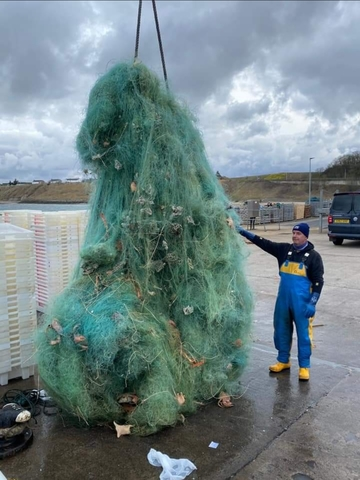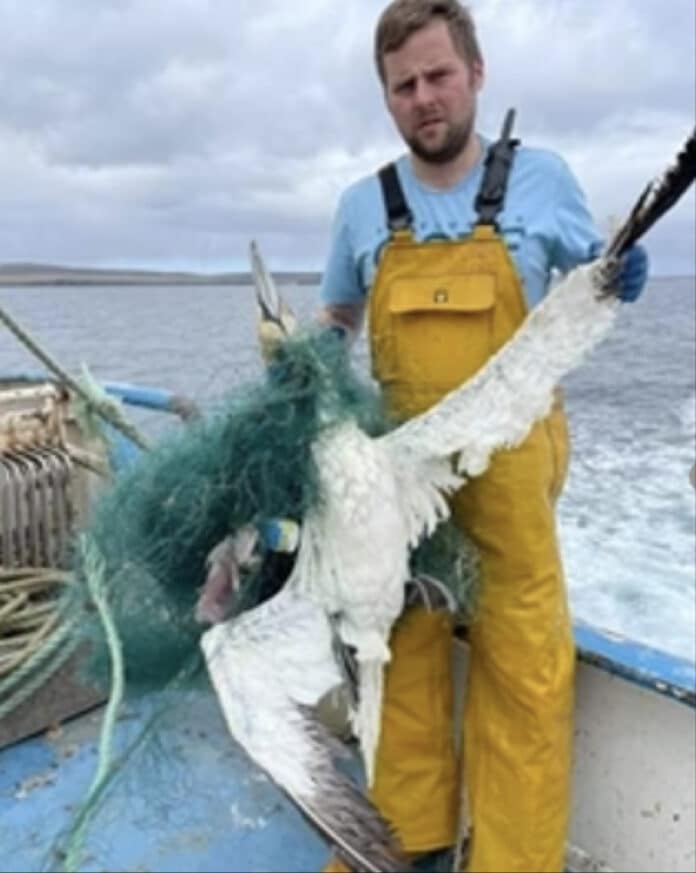Powerful evidence suggests that fishing fleets are deliberately dumping their used nets and lines at sea, threatening the complete collapse of marine ecosystems.
How could they be so careless? How do fishing vessels lose so many of their nets and longlines that this “ghost gear”, drifting through the oceans, now presents a mortal threat to whales, dolphins, turtles and much of the rest of the life of the sea? After all, fishing gear is expensive. It is either firmly attached to the vessel or, using modern technologies, easily located.
I’ve asked myself these questions for a while, and I think I now have an answer. It comes from an unlikely source: a trawlerman working in Scotland. I’m not a fan of trawling, but I recognise that some operations are more damaging than others. He and his colleagues now appear to be pulling in more nets than fish. On trip after trip they catch vast hauls of ghost gillnets and longlines, often wrapped around marine animals. He has sent me his photos, which are so disturbing I can scarcely bear to look: drowned seabirds, decapitated seals andfish and crustaceans of many species, which died a long, slow death. Where are these nets and lines coming from? He believes they’re being deliberately discarded.

I have checked his identity, but he wants to remain anonymous. Like other local trawlers, his boat brings its waste to land. The problem, he says, lies with large vessels, many from France and Spain, that spend four to six weeks at a time at sea. They don’t have enough storage space for the rubbish they generate: most of the hold is dedicated to frozen fish. Worn-out gillnets and longlines should be returned to port for disposal. But those he retrieves have a revealing characteristic: the expensive parts, those that can be reused – floats, weights and hooks – have been cut off. This, he believes, is a giveaway: if you find a net or line like that, it has been deliberately thrown overboard.

He and his colleagues, he says, often watch French and Spanish boats landing plenty of fish in Scottish ports when “no rubbish is taken ashore by these vessels”. He estimates that a typical crew of 20 on a month-long fishing voyage would generate roughly 20 cubic metres of waste, aside from the fishing gear. Where is it? There might be a clue in some of the other rubbish his boat trawls up: bin bags full of French and Spanish food wrappers. As for the gear, he tells me that he sees boats come into port and “miles and miles of new gillnetting is put onboard – but none is taken ashore for discard”.

The nets these boats use are enormous: every large vessel deploys between 50 and 70 miles of them. But gillnets tend to wear out quickly. The fisherman tells me, “the vessel I work on takes ashore approximately one cubic metre of discarded gillnets every four to five days on average.” That’s a lot of net.
Gillnets have been banned from many waters because of their very high rates of bycatch, and their mysterious tendency to go missing. In Scotland, they are prohibited within six miles of the coast. But these boats work farther from the shore. Beyond 12 miles, my contact says, it’s “basically bandit territory for any vessel not UK-registered, as UK law does not apply”. He alleges that, while local boats are closely regulated, there is practically no monitoring of foreign, offshore vessels.
Competition between national fishing fleets is an explosive issue, further charged by Brexit. At first I was wary of these claims, as I know how bitter the rivalry has become. But the photographic evidence speaks for itself, and his testimony is compelling. Moreover, it’s clear that there is a new mood among many of the local boats, which are now desperate to save their fisheries. Most of them are involved in the Fishing for Litter scheme, landing the discarded gear and other rubbish they catch. But this is likely to be a small fraction of the equipment being dumped. Unless active gillnetting and ghost fishing by discarded nets are stopped, my contact believes, the entire marine ecosystem is likely to collapse.
He and other fishers “have written to the authorities until we are blue in the face”, but he says he has been repeatedly stonewalled. It’s a sign of desperation that he has come to me, a longstanding critic of his industry.
When I approached the Scottish government, it told me: “We take protection of the marine environment seriously and are clear that any form of dumping and other illegal activities is completely unacceptable … We would encourage anyone with intelligence relating to suspicious activities by vessels to report this to us on our website.”
But, as the Scottish government’s own report points out, “no data or studies” have been produced showing where the discarded gear is coming from. This is despite the fact that, in the north Highlands, commercial fishing gear accounts for 90% of the ocean plastic picked up by beach cleaners, and that entanglement in static fishing equipment is a major cause of death for minke and humpback whales in Scotland. There’s a reliable principle of public administration: if a government takes a genuine interest in an issue, it commissions researchers to study it. No data tends to mean no interest.
There are similar issues all over the world. Gillnetting and the ghost fishing it causes have reduced the population of vaquita – the world’s smallest member of the whale and dolphin family, which lives in Mexico’s Sea of Cortez – to fewer than 20. Last week a young humpback whale was spotted in Antarctic waters, its dorsal fin severed, with nets cutting through the skin around its tail. As global seafood consumption has doubled in 50 years, the issue has become ever more urgent.
Yet most governments propose to do nothing except “encourage” fishers and gear manufacturers to behave responsibly, without sanctions or incentives. No vessel should be allowed to leave port unless it has enough space to store all its rubbish. Mandatory deposit return schemes would ensure that fishers returned used gear to the manufacturers at the end of its life. All nets should be traceable to the boats that use them. While some equipment is bound to be lost accidentally, it’s not hard to spot patterns of deliberate disposal.
But, like the fictional US president in the movie Don’t Look Up, the world’s governments, faced with ecological collapse, have again decided to “sit tight and assess”.
If you like our content please keep us going for as little as £2 a month https://dorseteye.com/donate/







